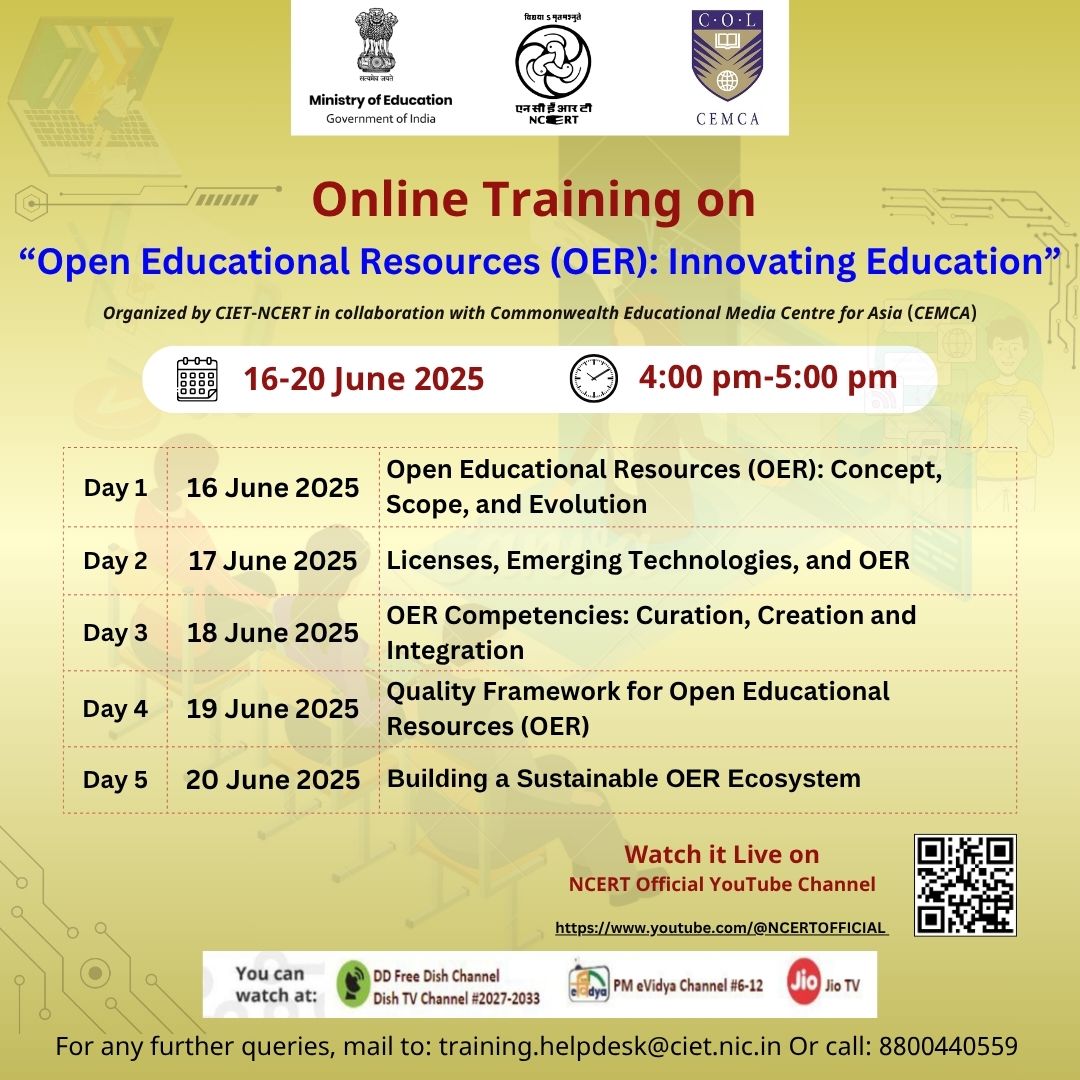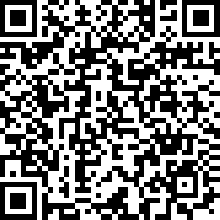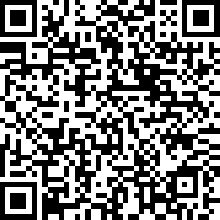
Five-Hour Online Training on
“Open Educational Resources (OER): Innovating Education”
In the evolving architecture of digital education, focused and flexible formats have emerged as key
strategies to transform how knowledge is delivered and retained. Compact learning units tailored to the
specific needs of modern learners help increase accessibility, sustain engagement, and improve retention.
These formats support just-in-time learning and personalised pathways, empowering learners to take control
of their educational journey. As the education system shifts towards equity, inclusion, and learner
autonomy, as envisioned in the National Education Policy 2020, such concise formats play an increasingly
critical role in achieving these outcomes.
Understanding the evolution and significance of these formats is essential to effectively adopt them in
diverse learning environments. Short-form learning addresses the limitations of traditional content-heavy
delivery models by offering modular, targeted learning experiences. By examining emerging trends,
theoretical frameworks, and the shift in learner behaviour, educators can develop a deeper appreciation for
how these approaches serve both institutional and individual learning goals. They also offer strategic
potential for upskilling and reskilling in rapidly changing academic and professional contexts.
Designing such learning experiences requires careful attention to instructional intent, content structure,
and learner experience. Organising content into coherent, purposeful, and measurable units helps maintain
clarity and relevance. Effective planning involves aligning objectives with outcomes, sequencing learning
appropriately, and maintaining learner motivation throughout. These formats demand not only brevity but also
precision. Each learning component must be meaningful on its own while contributing to broader learning
objectives. Careful attention to design ensures that compact content is not only accessible but also
impactful.
Technology plays a vital role in enriching and personalising short-format learning. Multimedia components
and interactive tools transform passive consumption into active engagement. Visuals, audio, animations, and
assessments can be used to make learning more appealing, immersive, and memorable. When chosen with
pedagogical purpose, these elements cater to varied learning preferences and enhance understanding.
Interactive formats also promote exploration, reflection, and feedback, which are integral to any
learner-centred approach.
The flexibility of these learning formats allows for self-paced, adaptive, and mastery-based progression.
Learners can revisit material, monitor their own progress, and focus on areas that require reinforcement.
Such personalisation fosters deeper learning and accommodates a range of learner profiles, including those
with diverse abilities, schedules, or learning speeds. These approaches also align with competency-based
models that emphasise demonstrated mastery rather than time spent. As institutions move towards
learner-driven education models, compact and self-directed formats become increasingly valuable.
Aligned with the vision articulated in the National Education Policy 2020, this five-day online training
programme curated by CIET-NCERT seeks to advance a comprehensive understanding of flexible, focused learning
strategies as transformative tools in education. The English version of the training will be conducted from
14 to 18 July 2025, followed by the Hindi version from 21 to 25 July 2025, with live sessions scheduled
daily from 4:00 PM to 5:00 PM. This initiative is designed to equip educators with the theoretical
foundations, practical expertise, and forward-looking strategies requisite for the purposeful integration of
these formats into contemporary teaching and learning practices.
All sessions will be streamed live via NCERT’s Official YouTube Channel, simulcast on PM eVidya DTH TV
Channels (6 to 12), and accessible on the JioTV mobile application. Furthermore, participants will be
afforded on demand access to recorded sessions through a dedicated YouTube playlist, thereby enabling
continuous engagement with key pedagogical insights and instructional approaches at their convenience.
Objectives of Training:
After completion of the training series, the learner will be able to:
- Attain an in-depth understanding of the conceptual foundations, evolution, and scope of open educational resources.
- Interpret and apply licensing frameworks while leveraging emerging technologies for the development and dissemination of OER.
- Build competencies for the effective curation, creation, and pedagogical integration of OER.
- Implement quality assurance frameworks to ensure the credibility, relevance, and inclusivity of open educational content.
- Formulate strategies to nurture sustainable, collaborative, and future-ready OER ecosystems.
- Contribute to the advancement of open education practices across diverse learning contexts.
Program Schedule:
| Date & Time | Title of the Sessions | Name of the Resource Persons | Banner Link | Presentation link | Video Link |
|---|---|---|---|---|---|
|
Day 1: Monday, 16 June 2025 |
Open Educational Resources (OER): Concept, Scope, and Evolution | Dr. B. Shadrach, Director, CEMCA, New Delhi | Day 1 | Presentation-1 | Video |
|
Day 2: Tuesday, 17 June 2025 |
Licenses, Emerging Technologies, and OER | Dr. Gaurav Singh Professor Media Production Division CIET-NCERT, New Delhi | Day 2 | Presentation-2 | Video |
|
Day 3: wednesday, 18 June 2025 |
OER Competencies: Curation, Creation and Integration | Dr. Biju K, Assistant Professor, School of Education and Training, Central University of Tamil Nadu, Tamil Nadu | Day 3 | Presentation-3 | Video |
|
Day 4: Thursday, 19 June 2025 |
Quality Framework for Open Educational Resources (OER) | Dr. Mohd Mamur Ali, Assistant Professor, Jamia Millia Islamia, New Delhi | Day 4 | Presentation-4 | Video |
|
Day 5: Friday, 20 June 2025 |
Building a Sustainable OER Ecosystem | Prof. Mohan Menon, Chairperson, DISHA Global Trust, Kochi, Kerala | Day 5 | Presentation-5 | Video |
|
Organising Team: Programme Advisory: Prof. Indu Kumar, Head- DICT, Central Institute of Educational Technology (CIET), NCERT, New Delhi. Programme Coordinator and Course Coordinator : Dr. Angel Rathnabai, Associate Professor, Central Institute of Educational Technology (CIET), NCERT, New Delhi. Technical Coordinator: Mr. Gurjeet Singh, Junior Project Fellow, Central Institute of Educational Technology (CIET), NCERT, New Delhi. |
|||||
How to participate?
Step 1 : Registration :
Participants need to register using the following link or the QR code -
https://docs.google.com/forms/d/e/1FAIpQLSdpy-C2wCAcrLA5wT2IgUSbgrhftkDTJ1JNgSCenizJDbxhgA/viewform?usp=dialog
or scan the QR code -
Step 2 : Watch live sessions and learn about the topic :
Participants have to attend
training sessions, which will be live-streamed on NCERT Official
YouTube channel - http://youtube.com/ncertofficial from 16ᵗʰ to
20ᵗʰ June 2025
4 PM to 5 PM Monday to
Friday
The session will also be telecasted live on the following :
- PM eVIDYA Channels #6-12
- DD Free Dish Channel
- DISH TV Channel #2027-2033
- JJio TV mobile app
If anyone has missed the live sessions, they can watch the recording using the playlist link: https://youtube.com/playlist?list=PLcsj1x9n9h4itbi-WPb01meuIy4YHRbce&si=khT_5B80Av2aCSCL
Step 3 : Take up the online course, participate in post-assessment, and get certified :
Those who are interested in getting a certificate, they need to do the following:
- Join the online course that will be launched on DIKSHA portal Course link :https://learning.diksha.gov.in/diksha/course.php?id=733§ion=1669।
This course will be open till 15 March, 2026. - Participants need to join the course, go through all the five videos.
- Participants need to take up the final assessment. Participants can attempt thrice the assessment.
- Participants who score 70% and above in the final assessment will get a certificate and they can access their certificate in their DIKSHA profile page itself. It may take 15-20 days to receive the certificate.
Step 4 : Submit Feedback : Participants are expected to submit feedback using the link or QR code
-
https://docs.google.com/forms/d/e/1FAIpQLSdIOCt78SnPsWphCB1epcVRkqDFTc-92j6K37vKP8LjlDCnAw/viewform?usp=dialog
or scan the QR code-
This feedback form is intended to know participants' experiences, learning, and suggestions regarding the online training. This will help us in further improvement of the virtual training process.
For any queries, mail to : training.helpdesk@ciet.nic.in or call: 8800440559.


